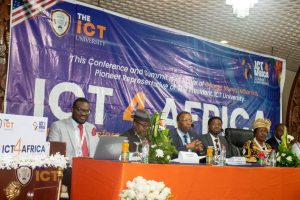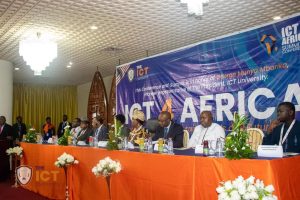Story, Louvier Kindo Tombe
One of the key note addresses delivered at the official opening of the 15th ICT for Africa Summit and Conference holding in Cameroon’s political capital – Yaounde was from former Nigerian President, Olusegun Obasanjo.
The lecturer of the ICT University through Visio-Conference acknowledged the fact that the success of digital transformation depends on policies and strategies put in place by governments.
“I would like to see more of the policy makers side to form the third leg of the tripod to ensure firm and solid standing for digital transformation generally, but more so for Africa, where digital density in all walks of life is still the most important,” Obasanjo said.
President Obasanjo added that concerning strategies “strategic initiatives have become business imperative in all areas of business, including agriculture, industries, other economic activities within the society”.
He believes that the intellectual side and the industry side should continue working together because the rapid advancement is mind boggling and “digital transformation has gone from the speed of the sun to the speed of light”.

ICT for Africa conference is placed on a very high pedestal to bring together the intellectual side of the digital world to work in close collaboration, to evolve policies, strategies, businesses, products, programs, that will continually bridge the gap.
ICT University setting standards in Africa

President Obasanjo thanked Professor Victor Mbaraka, for inviting him once again to be a part of the ICT for Africa Conference and Summit.
To the former President, the founder of the ICT University is more concerned about digital divide and particularly the backward state of Africa in ICT.
That is why he decided not to sit down doing nothing but make contribution in finding solutions.
The founding of ICT University, based on the U.S. curriculum, and the establishment of annual summit conference on ICT for Africa, are two of the ways that Victor believes he will make contribution to closing the digital divide between Africa and the rest of the world, particularly the industrialized world.








